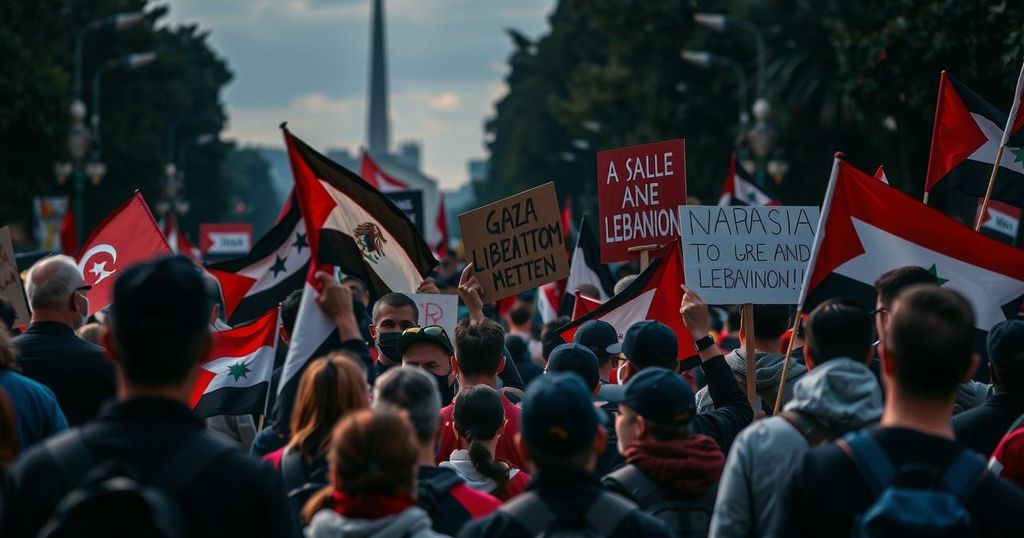Protesters in Jordan’s capital, Amman, rallied against Israeli military actions in Gaza and Lebanon, criticizing U.S. support for Israel and Arab governments’ responses. They condemned the humanitarian blockade in northern Gaza and voiced their opposition to the dismantling of UNRWA, stressing the dire consequences for Palestinian residents. The protests reflect a deep concern for Palestinian rights and a call for change in Jordanian policy.
In the capital of Jordan, Amman, large crowds took to the streets to protest against the ongoing Israeli military actions in Gaza and Lebanon. Following Friday prayers, demonstrators expressed their solidarity with Palestinian and Lebanese people, voicing their opposition to the unwavering support of the United States for alleged Israeli transgressions. The protests also targeted Arab governments, accusing them of negligence in the face of these continued assaults on civilians. The protesters condemned the blockade imposed on northern Gaza, which has severely hampered the delivery of humanitarian aid amidst Israel’s recent intensified operations. Secretary General of the Islamic Action Front Party, Murad Al-Adaileh, emphasized the severity of the situation by condemning Israel’s prohibition on the United Nations Relief and Works Agency for Palestine Refugees in the Near East (UNRWA). Al-Adaileh stated, “Today, truthfully, America and the entity (Israel) are waging a war of extermination and famine against our people in Gaza… This project wants to end the Palestinian cause and liquidate it.” Meanwhile, Philippe Lazzarini, commissioner general of UNRWA, cautioned that recent Israeli legislation aimed at dismantling UNRWA’s operations could result in dire consequences for millions of Palestinians dependent on these services for education and healthcare. Protests in Amman have become a consistent platform for expressing outrage over what many consider Israeli genocidal actions, which have claimed over 43,700 Palestinian lives and injured more than 103,258 since October 7, 2023. Moreover, the crisis has similarly affected Lebanon, yielding more than 3,370 casualties and over 14,300 injured individuals. Protesters have demanded that Jordan reconsider its peace agreement with Israel, reflecting a growing discontent with the status quo and a desire for change regarding the Palestinian cause.
The backdrop of the protests in Jordan centers on the ongoing Israeli military campaigns in Gaza and Lebanon, which have raised significant humanitarian concerns. In recent months, these campaigns have intensified, resulting in extensive loss of life and displacement of civilians. The political climate in the region is further complicated by the relationship between Israel and the United States, with assertions that American support enables Israeli actions against Palestinians. UNRWA plays a crucial role in providing aid and services to Palestinian refugees, and any disruptions to its operations can exacerbate the already dire humanitarian situation. The protests in Jordan highlight a broader sentiment of dissatisfaction among Arab nations regarding their governments’ responses to the Israeli-Palestinian conflict.
The protests in Amman signify a strong public outcry against the Israeli offensive in Gaza and Lebanon, driven by a profound sense of solidarity for the Palestinian cause. With alarming casualty figures and humanitarian crises reported from both regions, activists express their discontent with both American and Arab governmental inaction. Furthermore, calls to abolish the peace treaty with Israel reflect a critical juncture in Jordanian and regional politics regarding the ongoing Israeli-Palestinian conflict. The voice of the protesters in Jordan underscores the urgent need for action and support for those affected by the conflict.
Original Source: www.presstv.ir






